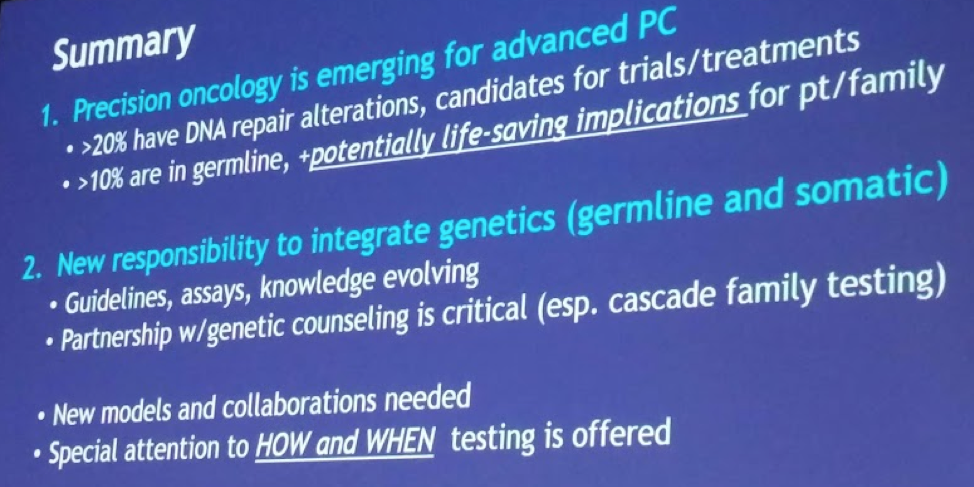Prostate cancer is a highly heritable disease. While family history has always been important, it has taken on new implications in the recent past. Family history beyond family history of prostate cancer is critical. A few genes matter (BRCA2, BRCA1, Lynch syndrome, HOXB1, etc). BRCA2 mutation carriers have a 3-9 fold increase in PCa and it is more aggressive/lethal! At this time, however, clinical management has not differed in advanced disease.
Germline mutations are those mutations existing since birth – what you are born with. Somatic mutations are tumor-related mutations. What is the utility of each? When should you check for each?
- Germline mutation assessment can help assess PCa risk
- Somatic mutation assessment can help assess for treatment-making decision
- The overlap of the two helps with treatment decision making and genetic counseling
1. >20% of mCRPC have defects in DNA repair genes – ie BRCA 1/2, ATM, MSH2, MSH6, etc.1
2. DNA repair defects may predict response to PARP inhibitors and platinum chemotherapy
3. 5-10% of advanced prostate cancers have MMR (mismatch repair) deficiency or MSI (microsatellite instability), and may be candidates for ICI’s2
4. Germline HSDB3 I245C variant associated with resistance to castration and may contribute to abiraterone resistance
5. CDK12 loss may predict ICI response (PD-1 inhibitors)
There are numerous trials ongoing for patients with mCRPC and DNA repair defects. However, genomic sequencing as a guide to treating advanced prostate cancer is still emerging – not yet clearly defined. Importantly, 8% of DNA repair defects were in the germline.
Pritchard et al highlighted these findings3. 12% of men with advanced PCa has germline mutations in DNA repair genes. This was irrespective of family history and age of onset. BRCA2 was most common, but there were numerous that accounted for just 1-2% of that 12%.
Nicolosi et al. found that 40% of men with PCa and high-risk germline variants did NOT meet guideline criteria4. These patients would have been missed with clinical screening!
Her conclusions:
1. Family history beyond PCa is critical! But even that may not be sufficient.
2. A few genes matter a great deal for advanced disease treatment. But there are many more we are still learning about.
3. Now, and looking ahead, tailored clinical management may be the key.
- ie PARP inhibitors in advanced disease – in trials now
- Trials of tailored PCa screening in carriers, etc.
To that effect, current NCCN guidelines recommend:
1. Inquiring about family and personal history of cancer
2. Consideration of germline testing in all men with metastatic and high/very-high-risk clinically localized PCa – regardless of personal or family history!
Her suggestion of who to offer germline testing?
Men with:
1. Any metastatic prostate cancer, especially if interested in trials
2. High or very high-risk loco-regional PCa
3. Family history of BRCA 1 and 2, Lynch syndrome, HOXB1 mutation, etc.
4. Family history of cancers (prostate and other cancers – breast, ovarian, pancreas, GI, etc).
Again, genetic testing depends on the question:
1) What is a patient’s or family’s risk of developing cancer? Germline testing
2) Is the patient a candidate for new treatments for advanced prostate cancer? Germline and somatic testing
However, there are challenges with implementing this:
1. Timely testing with adequate education/counseling
2. Ensuring appropriate clinical follow-up and management
3. New models are needed: academic/community, centers of excellence, etc.
Her summary slide was excellent and worth noting:

Presented by: Heather Cheng, MD, University of Washington School of Medicine, Seattle Cancer Care Alliance
Written by: Thenappan Chandrasekar, MD, Clinical Fellow, University of Toronto, Twitter: @tchandra_uromd, at the 2018 ASCO annual meeting - Chicago, IL, USA
References:
1. Robinson D, Van Allen EM, et al. Integrative Clinical Genomics of Advanced Prostate Cancer, Cell, 2015
2. Pritchard et al. Complex MSH2 and MSH6 mutations in hypermutated microsatellite unstable advanced prostate cancer, Nature Communications, 2014
3. Pritchard et al, Inherited DNA-Repair Gene Mutations in Men with Metastatic Prostate Cancer, NEJM, 2016
4. Nicolosi et al. Need for re-evaluation of current guidelines based on results from germline genetic testing in prostate cancer, ASCO 2017 abstract
Read More: How I Do It: Precision Medicine for Prostate Cancer in the Real World - A. Oliver Sartor, MD


